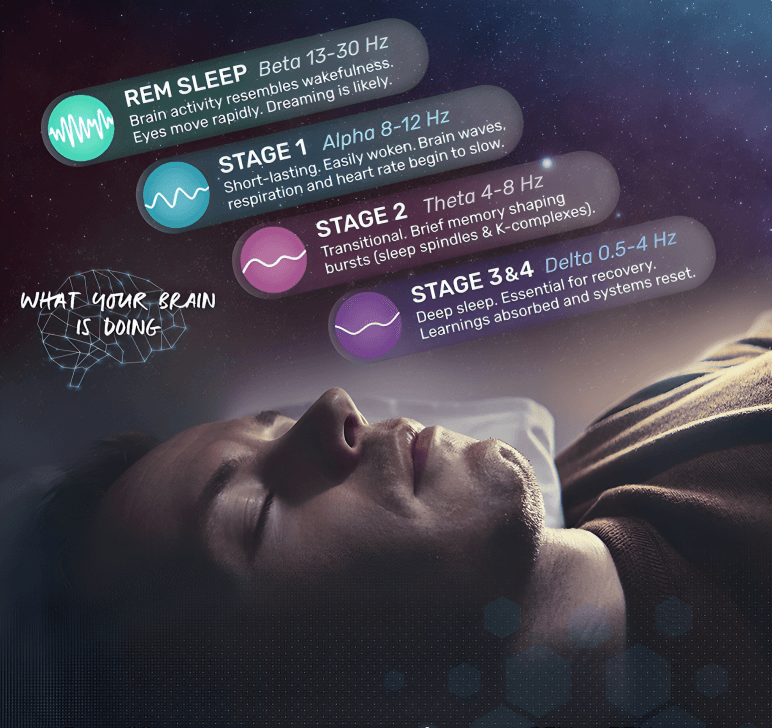
“
Understanding the effects of sleep on brain health is essential to grasp how rest influences our memory, emotions, and cognitive function. Sleep is not simply a period of rest—it’s a critical time when the brain undergoes vital maintenance. From strengthening neural connections to flushing out toxins, sleep shapes our mental sharpness, emotional regulation, and even long-term brain resilience. 1
1
”
During deep sleep, the brain strengthens synaptic connections formed during the day, reinforcing learning and memory consolidation, making sleep crucial for academic, professional, and life success. 1
The brain's glymphatic system becomes highly active during sleep, flushing out toxic waste products like beta-amyloid, which are associated with Alzheimer’s disease if allowed to build up over time. 2

REM sleep is essential for emotional resilience, allowing the brain to process and neutralize emotional experiences, which helps reduce anxiety and supports better mood regulation during waking hours.
Sleep influences neuroplasticity—the brain’s ability to rewire and adapt. Without enough rest, the brain becomes less flexible, making it harder to learn new skills or recover from trauma. 3
Poor sleep alters the brain’s reward system, increasing cravings for high-calorie foods and decreasing self-control, linking sleep loss to not only weight gain but also reduced mental clarity and discipline. 4
Consistent sleep strengthens hippocampus activity, which plays a key role in memory storage. When sleep is disrupted, this region struggles to archive new experiences effectively. 5
Sleep boosts problem-solving abilities and creativity by allowing the brain to form unique connections between unrelated ideas during both REM and non-REM sleep phases. 6
Chronic sleep deprivation shrinks the gray matter in the frontal lobe, a critical region for complex thinking, judgment, and emotional control—showing how lack of sleep can slowly damage brain health. 7
Insufficient sleep reduces the production of neurotransmitters like serotonin and dopamine, which are crucial for mood stability, motivation, and a sense of mental well-being. 8

Adolescents require more sleep due to rapid brain development. Missing out on sleep during these years can disrupt emotional control and impair academic performance.
Naps can benefit brain function when timed correctly, enhancing alertness, mood, and memory consolidation—especially if taken for 20–30 minutes during the early afternoon. 9
Sleep disorders such as sleep apnea can deprive the brain of oxygen, leading to micro-damage in brain tissue and increasing the risk of stroke, memory loss, and cognitive decline. 10
Dreaming, especially during REM sleep, plays a vital role in problem-solving, emotional processing, and preparing the brain for challenges ahead, like rehearsing for a presentation or conflict. 11
A single night of sleep deprivation can reduce brain performance equivalent to a blood alcohol concentration of 0.05%, impairing judgment, coordination, and focus. 12
Regular, high-quality sleep promotes myelin growth, a fatty substance that protects nerve fibers and speeds up communication between brain cells, boosting mental performance and response time. 13

Shift workers who disrupt their circadian rhythm often experience long-term cognitive issues, including memory lapses, reduced concentration, and even increased risk for neurodegenerative conditions.
Meditation before bedtime has been shown to improve sleep quality, which in turn enhances brain health by reducing stress-related brain inflammation and improving memory. 14
Lack of sleep decreases brain-derived neurotrophic factor (BDNF), a protein vital for brain cell survival and neurogenesis, weakening the brain’s capacity to recover or adapt after stress. 15
Brain scans show that even one night of good sleep boosts activity in regions responsible for empathy, concentration, and moral reasoning, helping people make wiser and kinder decisions. 16
Philosopher René Descartes, known for the phrase “I think, therefore I am,” believed dreams offered truths about the mind. Today’s science confirms sleep reveals core brain functions essential to identity. 17


